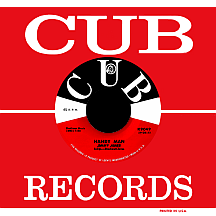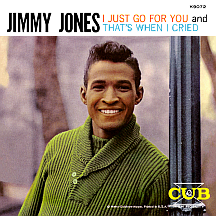JIMMY JONES
Handy Man
'If your broken heart should need repair...' (as opposed to just getting a leaky faucet fixed), then the "Handy Man" is the guy to call, according to New York City vocal group The Sparks of Rhythm. Baritone singer Floyd Edmonds formed the act as The Berliners while in the Army stationed in Germany; in 1955, after some changes in personnel, the then-Brooklyn-based Sparks were making records for the Apollo label. One member was James Jones, a former child tap dancer from Birmingham, Alabama, just turned 18, who spent a few months with the group that summer and fall. He sang lead on a couple of singles (ballads "Don't Love You Anymore" and "Hurry Home," both crediting him as a cowriter), then left to form his own group in Harlem with tenors William Walker and Robert Moore, baritone Melvin Walton and bass Kerry Saxton. They signed with Newark, New Jersey's Savoy Records in early 1956 and owner Herman Lubinsky verily dubbed them The Savoys.
At nearly the same time James and the Savoys were putting together their sprightly-tempoed debut, "Say You're Mine," the Sparks of Rhythm assembled in N.Y. to lay down what became their final four tracks, one of which was "Handy Man," a midtempo sizzler with a bass lead by Andrew Barksdale that he'd written with group member Charles Merenstein. The lyrics suggested a personalized cure for any woman's love woes, its protagonist keeping '...busy 24 hours a day' without...necessarily...expecting any romantic payback! The recording was not released. Jones and his group, in the meantime, connected with George Goldner and became The Pretenders (Goldner made a deal that let Lubinsky keep the Savoys name) and two singles on Rama with Clyde McPhatter-inspired leads by Jones resulted: "I've Got to Have You Baby" and "Lover." The latter was billed as Jimmy Jones and the Pretenders and featured a new member, former Sparks of Rhythm bass Barksdale.
Lack of sales were partly responsible for the group's label-hopping. A spring '57 effort on Whirlin' Disc, the peppy "Part Time Sweetheart," came several months before the group, using the name Jimmy Jones and the Jones Boys, came up with "The Whistlin' Man," a variation on the Sparks' "Handy Man" with different lyrics like 'I whisper sweet things, you tell all your friends...and they'll come runnin' to me!' Further Pretenders recordings were issued as the labels got progressively smaller, including "Tonight" on Holiday and "Blue and Lonely" on both Central and Apt. In the spring of 1958, "Peppermint Stick," a doo wopper composed by Moore and Jones, made some noise in New York City for The Elchords, selling better than all Pretenders discs combined; by mid-'59 they had split up. Jimmy did a one-shot for Epic, a well-produced pop ballad under Jesse Stone's direction called "You For Me to Love," but soft singing was never what he'd set out to do. Turns out timing was good for another go-around with that handy little whistling song.
'Hey girls, gather 'round': Working with Otis Blackwell (who'd penned some of Elvis Presley's top hits), Jimmy reworked "Handy Man" (with Blackwell's whistling) as an urgent, uptempo endorsement of his heart-mending ability, summing it all up in just under two minutes. Released in late '59 on MGM's Cub subsidiary, the single debuted on the national charts in December, reaching the top ten in early February and number two in early March (the first of five consecutive artists to see their hit stall in the runner-up position behind 1960's biggest single, Percy Faith's "(Theme from) A Summer Place"). As the title of Jimmy's hit became a slang term for "lover," some of his earlier works were rereleased, including the Savoys' "Say You're Mine" (retitled "Please Say You're Mine"). The Pretenders' "Lover" appeared on Roulette (as Jimmy "Handy Man" Jones) and the original Sparks of Rhythm recording of "Handy Man," which he hadn't been a part of, finally saw the light of day on an Apollo 45.
"Good Timin'," a clever ditty by Fred Tobias and Clint Ballard, Jr., arrived on its heels ('a-tick-a-ticka-a, tack-a-tack-a...' emulating the 'come-a-come-a-come-a...' of "Handy Man"), citing the timely good fortune of David versus Goliath, Christopher Columbus and Queen Isabella and 'you and I,' making its point in just over two minutes. The record spent several weeks in the top ten between May and July 1960. Jimmy's two smashes (one more than a great many artists have been able to manage) proved difficult to follow. "That's When I Cried" had a short run that summer, "Old MacDonald" tune "Ee-I Ee-I Oh!" was a misfire, its flip, "Itchin'," the stronger side (Jim had no problem hitting those really high notes!), then "I Told You So" was a minor spring '61 chart single, his best shot at a third hit. But it wasn't to be.
Three more singles appeared on Cub through mid-1962. Jones had one-off 45s on Rojac, Vee-Jay ("Mr. Fix-It," a gimmicky '63 merging of his two hits), Taylor, Roulette, Parkway (a 1966 take on the eight-year-old Huey (Piano) Smith smash "Don't You Just Know It"), plus two for Bell in 1967 (The Showmen's "39-21-40 Shape" and a remake of the Buddy Holly gem "True Love Ways"). Later, he spent a few decades performing on the oldies circuit. In the '70s there were no less than two other vocalists named Jimmy Jones who achieved a modicum of success (one gospel, the other a soul singer). Birmingham Jimmy's signature song embedded itself deeper into the pop culture when Del Shannon and James Taylor (in 1964 and 1977, respectively) had hits with "Handy Man," making their own compelling claims of expertise as broken-heart-healers.



